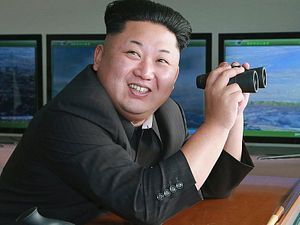After repeatedly hitting North Korea with sanctions over its missile and nuclear tests, the United States on Wednesday took the unprecedented step of targeting leader Kim Jong-un personally — this time for human rights abuses.
The U.S. Department of the Treasury named Kim, 10 other officials, and five government bodies as responsible for gross human rights violations in North Korea, opening the way for the seizure of any property or related assets under U.S. jurisdiction.
The sanctions, the first aimed at North Koreans because of human rights violations rather than weapons development, also ban Americans from carrying out transactions with the blacklisted parties.
In a statement released on its website, the U.S. Treasury said Kim held responsibility for rights violations including “extrajudicial killings, enforced disappearances, arbitrary arrest and detention, forced labor, and torture” as leader of the regime.
Among the other designated individuals, three were implicated for their work for the Ministry of People’s Security or the Ministry of State Security, both of which are involved in the administration of the country’s network of political prison camps. Choe Pu-il was named as the Minister of People’s Security, Ri Song-chol was listed as the Counselor in the Ministry of People’s Security, and Kang Song-nam was identified as Bureau Director with the Ministry of State Security. The seven other officials were described as members of the Workers’ Party of Korea or the government.
“Under Kim Jong-un, North Korea continues to inflict intolerable cruelty and hardship on millions of its own people, including extrajudicial killings, forced labor, and torture,” Adam J. Szubin, acting under secretary for Terrorism and Financial Intelligence, said in the statement.
“The actions taken today by the Administration under an Act of Congress highlight the U.S. Government’s condemnation of this regime’s abuses and our determination to see them stopped.”
Washington has previously sanctioned individual leaders such as Syrian President Bashar al-Assad, but had declined to go after the North Korean dictator directly. With Kim not known to own property in the U.S. and only a handful of Americans having access to the leadership, it is unclear what practical effect the measures will have.
Writing in the Daily Signal, the Heritage Foundation’s Bruce Klingner predicted significant fallout from the measures — both financially and in terms of international prestige.
“Sanctioning Kim Jong-un and others will not only have a direct financial impact on the North Korean regime, but could also have powerful secondary reverberations,” he said. “Botswana severed diplomatic ties with North Korea after the publication of the U.N. report, while South Korea and other nations canceled economic contracts with North Korea after the regime’s most recent nuclear test.”
Former State Department sanctions expert Peter Harrell gave Reuters a more cautious assessment. He said it was unlikely assets would actually be frozen “given the realities of where Kim Jong-un and his cronies likely hide their assets.”

































